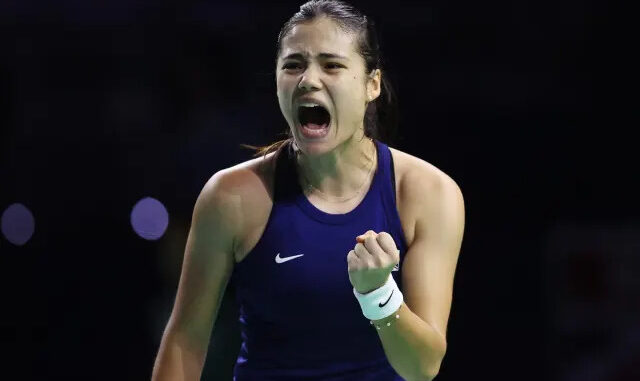
Emma Raducanu to Cut Down on Sponsorship Days After Learning Valuable Lesson
In a candid revelation, British tennis star Emma Raducanu has shared her decision to reduce the number of days she spends on sponsorship commitments, explaining that she has learned valuable lessons from her experiences over the past couple of years. Raducanu, who made an astonishing breakthrough in the sport with her victory at the 2021 US Open, quickly became one of the most marketable athletes in the world, attracting multiple high-profile sponsorship deals. However, the 21-year-old has since realized that balancing commercial responsibilities with the intense demands of professional tennis has not always been smooth.
The Pressure of Balancing Sport and Sponsorships
When Raducanu burst onto the scene with her unexpected Grand Slam win, it was not just her tennis ability that captured attention but also her commercial potential. Brands from Rolex to Nike flocked to sign her, and her youthful charm, global appeal, and remarkable achievements made her an ideal ambassador for a range of products. She became one of the youngest athletes ever to secure multi-million-pound endorsement deals, which included partnerships with sportswear giants, car manufacturers, and financial institutions.
However, Raducanu’s rise to the top has not been without challenges. As her career began to gain momentum, so too did the demands from her sponsors. These included promotional events, photoshoots, appearances, and other engagements, all of which are essential for maintaining brand partnerships but can be extremely time-consuming. Balancing these commercial commitments with the grueling demands of a professional tennis career, including travel, training, and competition, proved to be difficult.
“I’ve learned my lesson,” Raducanu admitted in a recent interview, acknowledging that the pressure to juggle sponsorship days with her tennis schedule had, at times, affected her performance on court. “I’ve had to evaluate how I spend my time, because when you’re on the circuit, you need to focus on what matters, and that’s your game,” she added.
The Challenges of Commercial Success
Raducanu’s decision to cut down on her sponsorship days reflects a deeper realization about the nature of professional sport and the importance of prioritizing personal and professional well-being. After all, athletes like Raducanu are not just representing themselves but also their sponsors, and this dual responsibility can become overwhelming.
In the first few years following her US Open triumph, Raducanu was seen at numerous high-profile events and even graced the cover of major magazines. Yet, as the pressure mounted, she found herself dealing with recurring injuries, lack of consistency, and a sense of mental fatigue. Her performances on the court began to fluctuate, and some critics were quick to point out the possible distractions caused by her busy off-court schedule.
“I felt a lot of pressure to be everywhere and do everything at once,” Raducanu admitted, acknowledging that the constant travel for tournaments alongside her sponsorship duties began to take a toll on her physical and mental health.
Reassessing Priorities: Focusing on Tennis
The decision to scale back on sponsorship obligations comes at a pivotal time in Raducanu’s career. While she has shown flashes of brilliance, including her impressive run at Wimbledon in 2021 and her triumph in New York, Raducanu has struggled with consistency, due in part to the various distractions off the court. As of late, she has been taking steps to refocus on her tennis, including working closely with a team of experts to help manage her schedule and find a balance between her professional and personal commitments.
“I’ve realized that I have to focus more on the tennis and make sure that’s the priority,” she said. “It’s important to find the balance, but ultimately, I want to be known for my tennis, not just the brands I represent.” Raducanu’s decision to cut back on sponsorship duties is a deliberate attempt to ensure that she can give her best on the court, without the pressure of having to juggle too many competing demands.
This shift in focus is likely to have a positive impact on Raducanu’s career in the long run. She is still incredibly young, with many years ahead of her in professional tennis, and her potential remains vast. By cutting down on off-court commitments, Raducanu can dedicate more time to her game, while also maintaining a healthy balance in her personal life.
Looking Ahead: A New Chapter for Raducanu
As Raducanu continues to mature as a player, it is clear that she is learning valuable lessons not only about tennis but about the lifestyle that comes with being a global sports figure. Her decision to scale back on sponsorship commitments signals a newfound maturity, as she understands the importance of protecting her time and energy for the things that matter most.
This pivot in her approach could prove to be a turning point in her career. If Raducanu can find the right balance, she has the potential to become one of the most consistent and dominant players on the WTA Tour. By taking a step back and reevaluating her priorities, she may be setting herself up for success in both her tennis career and her personal life.
Ultimately, Raducanu’s experience serves as a reminder of the intense pressures that come with being a professional athlete. Success on the court can lead to fame and commercial opportunities, but it is important to ensure that the focus remains on the sport itself. As Raducanu looks to continue her journey in tennis, she will do so with a clearer sense of what truly matters—her game, her health, and her long-term success in the sport she loves.

Leave a Reply